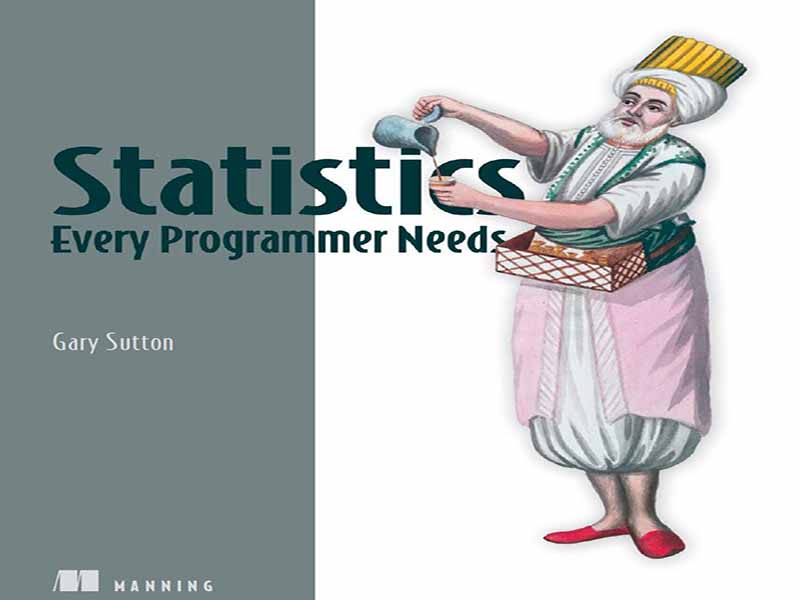- عنوان کتاب: Statistics Every Programmer Needs
- نویسنده: Enrico di Bella, Vincenzo Gioia
- حوزه: برنامه نویسی ریاضیات
- سال انتشار: 2025
- تعداد صفحه: Gary Sutton
- زبان اصلی: انگلیسی
- نوع فایل: pdf
- حجم فایل: 6.15 مگابایت
تصمیمگیری مبتنی بر داده به سنگ بنای تجارت مدرن، فناوری و تحقیقات علمی تبدیل شده است. چه پیشبینی روندهای مالی، چه تشخیص فعالیتهای بالقوه کلاهبرداری یا مدیریت پروژههای بزرگ، روشهای کمی پایه و اساس حل مسائل پیچیده را با اطمینان فراهم میکنند. با این حال، اغلب اوقات، تصمیمات حیاتی بدون استفاده از این تکنیکهای قدرتمند گرفته میشوند و در عوض به شهود، سنت یا تحلیل ناقص متکی هستند. این وضعیت باید تغییر کند. توانایی بهکارگیری روشهای استدلال آماری و بهینهسازی دیگر یک مهارت تخصصی نیست: بلکه یک شایستگی ضروری برای متخصصان در هر زمینه دادهمحور است. این کتاب از نیاز به پر کردن شکاف بین آمار نظری و اجرای عملی – بهویژه برای کسانی که با دادهها کار میکنند اما ممکن است پیشینه رسمی در مدلسازی آماری نداشته باشند – زاده شده است. حرفه من حول استفاده از تکنیکهای آماری و تحلیلی برای پیشبرد هوش تجاری و بهبودهای عملیاتی بوده است. در طول سالها، من از نزدیک دیدهام که چگونه برنامهنویسان، تحلیلگران و متخصصان در زمینههای مختلف از درک عمیقتر آمار – نه فقط به عنوان یک رشته نظری، بلکه به عنوان ابزاری برای حل مشکلات دنیای واقعی – بهرهمند میشوند. با این حال، بسیاری از منابع یا بیش از حد بر مشتقات ریاضی بدون کاربرد تمرکز میکنند یا کدی را بدون توضیح کافی در مورد اصول اساسی ارائه میدهند. این کتاب با هدف ایجاد تعادل، هم «چگونگی» و هم «چرایی» پشت هر تکنیک ارائه میدهد. ایده این کتاب زمانی شکل گرفت که متوجه افزایش تقاضا برای تکنیکهای آماری و یادگیری ماشین در تجارت، امور مالی و مهندسی شدم. شرکتها دانشمندان و تحلیلگران داده را به تعداد بیسابقهای استخدام میکردند، اما بسیاری از متخصصان خود را نیازمند به کارگیری روشهای پیشرفته بدون روشی ساختاریافته برای یادگیری آنها یافتند. من به طور فزایندهای، متخصصانی را دیدهام که میتوانند اسکریپتهای پایتون بنویسند و نتایج را به رهبری ارائه دهند، اما درک عمیقی از آنچه در پشت صحنه اتفاق میافتد، ندارند. این دانش سطحی میتواند منجر به تفسیرهای نادرست، فرضیات مدل ضعیف و تصمیمگیریهای ناقص شود. دانستن نحوه اعمال روشهای آماری مهم است – اما درک زمان، چرایی و شرایطی که آنها کار میکنند، بسیار مهم است. این کتاب طیف وسیعی از موضوعات ضروری برای هر متخصص دادهمحور را پوشش میدهد، از نظریه احتمال بنیادی شروع میشود و به تحلیل رگرسیون، درختهای تصمیمگیری، شبیهسازیهای مونت کارلو و زنجیرههای مارکوف میپردازد. فصلهای بعدی، مدیریت پروژه و کنترل کیفیت را بررسی میکنند – حوزههایی که روشهای کمی نقش حیاتی در تضمین کارایی و قابلیت اطمینان دارند. اگرچه پایتون در سراسر کتاب به عنوان یک ابزار محاسباتی استفاده میشود، اما این فقط یک کتاب پایتون نیست؛ بلکه راهنمایی برای استفاده مؤثر از روشهای کمی است و کد قابل استفاده مجدد را در کنار توضیحات واضح ارائه میدهد تا از درک مفاهیم پشت محاسبات اطمینان حاصل شود. تمرکز اصلی این کتاب نشان دادن چگونگی کاربرد این تکنیکها در عمل است. به عنوان مثال، شما یاد خواهید گرفت که چگونه مدلهای پیشبینی را برازش دهید، تصمیمات را با استفاده از بهینهسازی مقید بهینهسازی کنید، نتایج را با روشهای مونت کارلو شبیهسازی کنید و الگوها را در توالیهای اعداد طبیعی تجزیه و تحلیل کنید. این کتاب همچنین بر اهمیت دقت آماری تأکید میکند و نشان میدهد که چه زمانی و چگونه نتایج را اعتبارسنجی کنید تا از نتیجهگیریهای گمراهکننده جلوگیری شود. چه یک برنامهنویس باشید که به دنبال افزایش دانش آماری خود، یک متخصص کسب و کار باشید که تصمیمات مبتنی بر داده میگیرد، یا دانشجویی که به دنبال روشی ساختاریافته برای رویکرد به روشهای کمی است، امیدوارم این کتاب به عنوان یک منبع ارزشمند عمل کند. تا زمانی که آن را تمام کنید، نه تنها میدانید که چگونه این تکنیکها را به کار ببرید، بلکه درک عمیقتری از اصول ریاضی زیربنایی آنها نیز خواهید داشت. مهمتر از آن، شما توانایی تصمیمگیری مبتنی بر داده را با اطمینان به دست خواهید آورد – و تضمین میکنید که به مشکلات پیچیده با وضوح و دقتی که شایسته آن هستند، رسیدگی میشود.
Data-driven decision-making has become a cornerstone of modern business, technology, and scientific research. Whether predicting financial trends, detecting potentially fraudulent activity, or managing large-scale projects, quantitative methods provide the foundation for solving complex problems with confidence. Yet, too often, critical decisions are made without using these powerful techniques, relying instead on intuition, tradition, or incomplete analysis. This needs to change. The ability to apply statistical reasoning and optimization methods is no longer a specialized skill: it is an essential competency for professionals in every data-driven field. This book was born out of a need to bridge the gap between theoretical statistics and practical implementation—particularly for those who work with data but may not have a formal background in statistical modeling. My career has revolved around using statistical and analytical techniques to drive business intelligence and operational improvements. Over the years, I have seen firsthand how programmers, analysts, and professionals in various fields benefit from a deeper understanding of statistics—not just as a theoretical discipline but as a toolkit for solving real-world problems. Yet many resources either focus too heavily on mathematical derivations without application or provide code without sufficient explanation of the underlying principles. This book aims to strike a balance, offering both the “how” and the “why” behind each technique. The idea for this book took shape as I noticed the increasing demand for statistical and machine learning techniques in business, finance, and engineering. Companies were hiring data scientists and analysts in record numbers, but many professionals found themselves needing to apply advanced methods without a structured way to learn them. More and more, I have seen practitioners who can write Python scripts and present results to leadership but lack a deep understanding of what is happening under the hood. This superficial knowledge can lead to misinterpretations, poor model assumptions, and flawed decision-making. Knowing how to apply statistical methods is important—but understanding when, why, and under what conditions they work is critical. The book covers a range of topics essential for any data-driven professional, beginning with foundational probability theory and moving through regression analysis, decision trees, Monte Carlo simulations, and Markov chains. Later chapters explore project management and quality control—areas where quantitative methods play a crucial role in ensuring efficiency and reliability. Although Python is used throughout the book as a computational tool, this is not just a Python book; it is a guide to using quantitative methods effectively, providing reusable code alongside clear explanations to ensure that you understand the concepts behind the calculations. A key focus of this book is demonstrating how these techniques are applied in practice. For instance, you will learn how to fit predictive models, optimize decisions using constrained optimization, simulate outcomes with Monte Carlo methods, and analyze patterns in naturally occurring number sequences. The book also emphasizes the importance of statistical rigor, showing when and how to validate results to avoid misleading conclusions. Whether you are a programmer looking to enhance your statistical knowledge, a business professional making data-driven decisions, or a student seeking a structured way to approach quantitative methods, I hope this book serves as a valuable resource. By the time you finish, you will not only know how to apply these techniques but also have a deeper appreciation for the mathematical principles that underpin them. More importantly, you will gain the ability to make data-driven decisions with confidence— ensuring that complex problems are approached with the clarity and precision they deserve.
این کتاب را میتوانید از لینک زیر بصورت رایگان دانلود کنید:
Download: Statistics Every Programmer Needs




































نظرات کاربران